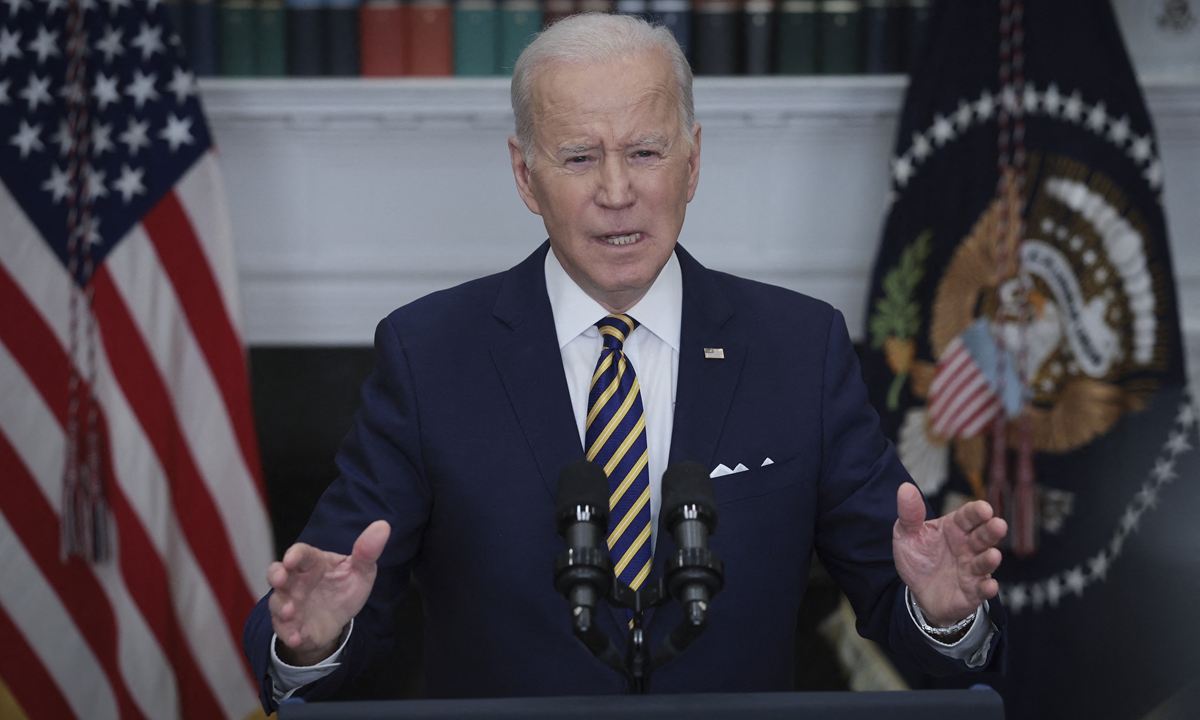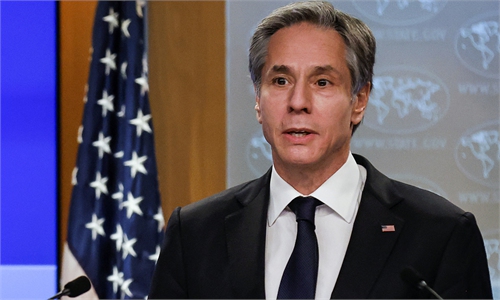
US President Joe Biden. Photo: AFP
The first US-Pacific Islands Country Summit got off to a "rocky start" amid widespread skepticism from Pacific island nations after the Solomon Islands rejected a draft US agreement and the Marshall Islands, Micronesia and Palau raised serious concerns about "insufficient" financial assistance from the US for the region.
As US President Joe Biden prepared to host the leaders of a dozen Pacific countries on Wednesday and Thursday in a first-of-its-kind gathering at the White House, the Solomon Islands sent a diplomatic note to other nations in the region saying there was no consensus on a joint declaration the Biden administration plans to unveil and that it needed "time to reflect" on the declaration, the Washington Post reported on Wednesday.
The Western media outlet described the setback as "a sign of the challenges Washington faces as it attempts to reassert influence in a region where China has made inroads."
The Guardian revealed on Wednesday just hours before the start of the summit that a leaked note, written by the embassy of the Solomon Islands, announced the country would not be endorsing the regional diplomatic agreement being proposed by the US. The 11-point declaration of the US-Pacific partnership commits Pacific countries and the US to working together "in the face of a worsening climate crisis and an increasingly complex geopolitical environment," the Guardian noted.
Different from the US-initiated draft, security cooperation between China and the Solomon Islands which was signed earlier this year has two key points - mutual benefits and respect, and no political strings attached. "These are the fundamental reasons that the cooperation with China is welcomed by locals in the Solomons," Chen Hong, director of the Australian Studies Centre at East China Normal University, told the Global Times.
Worried about China's influence in the South Pacific region, the US has arranged intensive visits and contacts with the island nation leaders, put together security-focused Partners in the Blue Pacific (PBP), and in this case, held a summit, all in an attempt to contain China. But their moves are chaotic and expose that the US is in a panic, Chen said.
Patricia Kim, a Brookings Institution fellow, wrote in a blog post that the US has been criticized for overlooking the Solomon Islands for decades and coming "too late to the region."
Other Pacific island nations expressed concerns about the haste with which the US convened the summit.
Anna Powles, senior lecturer with the Center of Defense and Security Studies at New Zealand's Massey University, was cited by the Washington Post on Wednesday as saying that the leaders of Vanuatu and Nauru are not attending because of elections. Kiribati will not be represented at the summit, while a few other countries were late invites.
Also, Marshall Islands, Micronesia and Palau raised serious concerns about "insufficient" financial assistance from the US to the region.
The US is looking to extend and renew agreements known as compacts with the Marshall Islands, Micronesia and Palau, which obliges the US government to provide financial assistance to them in exchange for defense responsibilities.
However, the Guardian on Wednesday revealed a leaked letter sent by ambassadors for Palau, the Federated States of Micronesia and the Marshall Islands to Kurt Campbell, the US National Security Council coordinator for Indo-Pacific Affairs, raising concerns about what has been offered by the US.
"The US economic assistance is insufficient… The gaps between the needs of our peoples and what has been offered are narrowed, but are far from closed," said the letter.
Other nations are also pushing for more economic investment from the US.
"Our biggest investment partner right now is China," Palau President Surangel Whipps Jr. said, Radio New Zealand (RNZ) reported on Wednesday. Whipps said he hoped the meeting with Biden would be "more than just a photo opportunity at the White House."
But financing promises made in this summit would be a challenge for Washington, said Director of the Lowy Institute's Pacific Islands Program Meg Keen, according to RNZ.
Several other Pacific nations, while welcoming increased US involvement in the region, have made clear they do not want a US military presence in the region
Samoan Prime Minister Fiame Naomi Mata'afa pressed the importance of maintaining peace in the region, and said she would not like to see increased US military presence in the Pacific, the ABC reported on Wednesday.
For Pacific island nations, the focus in the summit with the US are economic development and climate change, which is the existential crisis that demands attention above all else, while for the US, the purpose of the summit is using the region as a tool and making it into a clique to suppress China, observers said. They have a huge mismatch between their appeals, observers stressed.
"The fact that the summit took place amid chaos and controversy dooms it to a farcical outcome," Chen said.


